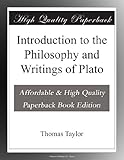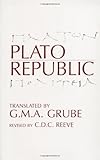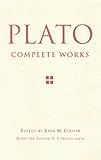|
Editorial Review Product Description
Long regarded as the most accurate rendering of Plato's Republic that has yet been published, this widely acclaimed work is the first strictly literal translation of a timeless classic. This second edition includes a new introduction by Professor Bloom, whose careful translation and interpretation of The Republic was first published in 1968. In addition to the correct text itself there is also a rich and valuable essay--as well as indexes and a glossary of terms--which will better enable the readerto approach the heart of Plato's intention. ... Read more Customer Reviews (41)  The Injustice of Not Reading
The Injustice of Not Reading
Plato's Republic is a book that shouldn't be taken lightly because if your not paying careful attention, you will get lost. The book at its' core is the answer to one of the most basic questions of human society: What is Justice? In this book, several Ancient Greek philosophers give it their best shot...with let's just say interesting results. Sure there are other intriguing discussions about forms of governance and class systems and structures, but everything leads back to the core of justice. Although this translation is quite good, I could've honestly done without the interpretive essay that makes up the books size. Inside this book are various ideas of justice, each both plausible on some level, but flawed in other aspects such is the nature of justice or any other human creation. This book should be read for its' great value in intellectual stimulation because not everything in life is concrete in form and black and white. Even though justice is subjective, not reading this book would be injustice.
 Reason allows us to live for something
Reason allows us to live for something
I read Plato's Republic for a graduate philosophy class. I paid close attention to Plato's thesis of courage in his Republic, which I expound below. I found G. M. A. Grubb's translation to be the best of several I read.
Plato's project in the Republic is to form the "perfect" society. "Reason allows us to live for something." Through reason we set goals and organize our lives around achieving goals. Plato argues that the government's duty to citizens is to provide justice, and educate citizens both men and women. The state's social structure stood for justice and was divided into three groups. Rulers- those trained to use reason and posses wisdom. Guardians/ Soldiers have courage/spirit. Artisans have moderation of appetites. Plato's ideal ruler, the "Philosopher King," should be 50 years old with 15 years of government experience and should have studied science and philosophy. The ruler must show a mastery of Arete = excellence vs. akrasia= weakening of will, or no self-control. The ruler should think logically not emotionally. In the Republic to insure excellent people Plato advocated selective breeding of excellent unmarried people who lived in communes, who did not own property.
Plato describes five types of government in the Republic:
1. Aristocracy- Plato considered this the best form of government; aristocracy embodies wisdom of the philosopher king.
2. Timocracy- military government embodies virtues of honor and courage.
3. Oligarchy- rule by a rich elite, their vice is greed, the rich get richer, the poor get poorer.
4. Democracy- mob rule, and chaos, it represents akrasia people are slaves of their desires and have little self-control.
5. Tyranny- this is the worst form of government. The vice is selfishness, one power crazed person in control.
Plato's purpose in the Republic is not to perfect the character of people as an end but only as a means to an end. Plato's aim has a definite effect on his definition of courage. I find this is especially the case when exploring his ideas on how to educate the Guardians of the city to act courageously. Plato's goal is to match a person's character disposition to a job they are naturally inclined to perform in the city. Once he [Plato] has introduced the city in 369 b-d, he immediately advances the thesis, which is to dominate the rest of the Republic, that the needs of its inhabitants can best be met if each person in it performs that single task, and that single task alone, for which he is naturally suited.
With this view of human nature in mind, in Plato's model society, he divides the citizens into three classes. Rulers from whom the "philosopher king," will be selected, Guardians who are soldiers to protect the state, and the rest of the citizens classified as Artisans This division of citizens precipitates a discussion by Plato on the four virtues that these citizens will bring to the state. In the history of philosophy this becomes known as the "four cardinal virtues"; wisdom, courage, moderation, and justice. With this introduction of courage as a virtue, Plato takes another crack at defining courage. What is also important to observe is that he introduces a new element, that of education, in his definition of courage that was absent from his early dialogue Laches.
Plato espouses the idea in the Republic that the Guardians need to possess certain natural qualities; such as strength, speed, and courage. It seems odd that Plato classifies courage as a natural quality possessed by certain people. This automatically presupposes that not all people can practice the virtue of courage. Plato's successor Aristotle, will argue against this notion in his EN. In addition, Plato argues that in order for people to be courageous they must also have an aggressive thumos [passion], which makes both people and animals fearless and determined. Plato fears that the Guardians could be susceptible to using their passion of aggressiveness against there own people. Therefore, he counsels that the Guardians who naturally possess aggressiveness have to also naturally possess the opposite characteristic of gentleness as well, so that their aggressiveness will only be used against the enemy and not their own citizenry.
This dialogue is significant in that it helps to flesh out Plato's notion of what ultimately makes a person courageous. First, Plato argues that the goal of education, which he compares to a sheepdog, is to watch over the Guardians; thus, with the proper education he believes the proper balance between exciting their aggressiveness and subduing it in the Guardians can be achieved. Second, Plato believes that if aggressiveness is properly excited by physical training, then the Guardian will be courageous. If overly excited they will be like a wild beast devoid of grace and will become ignorant. Finally, Plato argues in his education section of the Republic, that to counter the possibility of a Guardian developing an over excited passion of aggressiveness, it is necessary to teach the Guardians literature and music during the same time they undergo physical training.
Thus, Plato hopes this balanced approach to educating the Guardians will then lead to courage being a controlled and calm act of endurance in battle, instead of a foolhardy lust for blood letting and an emotional reaction to war. Not only does Plato spend a significant amount of time advocating for the tools necessary to subdue the passions of the Guardians in book three of the Republic, but another important point in Plato's philosophy to consider is that since he believes that a Guardian's aggressiveness is influenced by literature he is very concerned by what type of literature is taught to them as well. Plato is very concerned that the archetypical heroic warrior Achilles, as depicted in Homer's epic poem the Iliad along with those depicted in Greek tragedies performed on stage, are bad examples for the Guardians to emulate. Consequently, Plato advises that heroes of Greek literature should be depicted as thoughtfully courageous and in control of their anger and physically resilient warriors. Thus, Plato seems to be using the term andreia [courage] to cover (at the least) both courage proper, which can only exist in some kind of unity with the other virtues, and raw mettle or aggressiveness, which can exist in conjunction with various vices. Plato in book four of the Republic does move on from his study of thumos as the prime motivating force to act courageously, to actually defining the virtue of courage. Plato defines courage as a person's ability to subdue their aggressiveness by the orders of their reason in regards to what they should be fearful of regardless of their own feelings of pain or pleasure. Plato's expounded definition of the virtue of courage is that a courageous act is an amalgamation of a person's natural passion of aggressiveness and properly educated rational beliefs over what is worthy regarding the possibility of losing their life or limb over.
 Great book, but the Kindle version is horrible
Great book, but the Kindle version is horrible
I have the 2nd edition in both book and Kindle form.I give the book form 5 stars; the Kindle version is horrible.You won't see this from the sample, but the index is completely useless - its simply a list of words with no hyperlinks.Additionally, none of the citations are present in the Kindle version, rendering it worthless for any serious study or using outlines.One wonders whether anyone at the publisher, Basic Books, bothered to read the Kindle version before releasing it.
Again, the book itself gets 5 stars, the Kindle version needs a lot of work before it's worth the money.
 A book that is holy
A book that is holy
Of all those who are today recognized as great philosophers, there may only be a few who merit the title in the true sense, while the others are perhaps more accurately commentators, essayists. Not to take anything away from any of the recognized greats - recognized as great for good reason - but with the true philosophers one comes across something different, and really more, than observation, invention, or sophistication. Instead, there is an extraordinary devotion to purity, above all, and to the stripping away of noise, excess, multiplicity, and all that the truth is buried beneath. The effect is not one of shock, or revelation, or elevated character, but of fulfillment and breathtaking beauty. Among this small circle are Plato, more recently Machiavelli, and more recently still Wittgenstein. One not only reads them at great gain, but re-reads them to discover new wonders each time. And among them, Plato is arguably without rival... and his Republic is, arguably, without end.
 Beautiful, provocative, and potentially dangerous
Beautiful, provocative, and potentially dangerous
First, a bit about "The Republic" itself.
Written in 380 BC, "The Republic" is one of Plato's best known, and most influential, works. It depicts a conversation between Socrates and several of his young followers about the nature of justice, political justice in particular, and what the ideal, perfectly just city or republic (the Greek word is *polis*, which invokes meanings of both community and political statehood) would actually look like.
In Socrates's view, the perfectly just polis would be founded on, and run according to, the dictates of reason. And reason, according to Socrates, dictates that for the polis to be truly just, it would need to be ruled by a philosopher-king (a man of spectacular intelligence, virtue, and vision), who, via the levers of state power and outrageous propaganda efforts, would control virtually every aspect of life within it for the common good. (In a word, the best way to describe Socrates's ideal political regime is totalitarian communism.) Thus, because family members tend to feel an allegiance to each other which sometimes conflicts with allegiance to the state, the family unit must be abolished. Private property must go. The idea that males and females are unequal in any respect must be crushed. Poetry, music, speech, and drama must be heavily censored so as to ensure they serve the state/common good. You get the picture.
In order to sell this to the masses, Plato famously proposes that a "noble lie" be perpetuated. That noble lie would be a "foundational myth", a comprehensive narrative which would make mere state action appear to be an expression of divine or cosmic right, and therefore, essentially unquestionable. From birth, citizens will be taught that the gods have mixed different proportions of gold, silver, or bronze into them. The rulers are gold people; that's why they rule. Common labourers are bronze people. In between are the silver people. And the gold people are the ones who can discern what type each person is; after they do so, each citizen will receive their proper job assignment according to how much of each metal they have.
What gives Socrates the right to recommend such drastic measures? Well, as he explains in the famous cave allegory, through reason, one can really come to know the Truth, capital T. Despite his protestations otherwise, Socrates obviously is a knower. That is, he knows what justice would look like: the ideal city he describes.
At least, that is the orthodox reading of this text. There is, as it happens, also an *unorthodox reading which requires mention here, because it is propounded in the interpretive essay included by translator Allan Bloom.
The orthodox reading takes Plato at face value: in the end, he views totalitarian communism (properly directed) as the most just regime. That's what he says, so that's what he means.
The unorthodox interpretation was developed by controversial political philosopher Leo Strauss, Bloom's mentor at the University of Chicago. According to Strauss, the great political texts tend to have a surface, or *exoteric*, meaning, but also a deeper, *esoteric* meaning inaccessible to all but the most sensitive, insightful, and virtuous readers. So in this case, viewing Socrates as a totalitarian communist is the result of a merely exoteric reading. An esoteric reading, by contrast, reveals - at least to Strauss, Bloom, and other Strauss followers - the opposite: that Socrates's entire speech was meant to be ironic - a reductio ad absurdum - and that he is, in Bloom's words (page 421), "actually engaged in a defense of democracy".
Many scholars find this reading difficult to take seriously. For one thing, an esoteric interpretation - like a typical conspiracy theory - by definition can produce little or no empirical justification for itself. A *suspicion*, or an unconscious projection, obviously is not the same as an argument constrained by the words on the paper (the proximity of this sort of approach to postmodern approaches is too obvious to elaborate; and perhaps tellingly, Straussians tend to be very sensitive about suggestions of similarity).
For another, in discussing Plato's views, Aristotle (who studied with Plato), never suggests that Plato wasn't in earnest. Moreover, in the other dialogues, Plato consistently expresses (through Socrates) admiration for Sparta, a closed, totalitarian society resembling the "just" republic advocated by him in "The Republic". Additionally, Socrates's contemporaries (like Aristophanes and Xenophon) many times make reference to Socrates's pro-Spartan sympathies; they make no intimation that there was anything "ironic" about this spartophilia. And if *this* wasn't enough, as a matter of historical fact, a number of Socrates's devout followers betrayed open, democratic Athens by helping Spartan agents organize a coup d'etat (resulting in many Athenian deaths).
So, the Straussian view that Plato, the starry-eyed admirer of Socrates, was actually an ironic, closet Jeffersonian democrat, despite championing totalitarian communism for an entire essay and defending its Spartan incarnation in several other dialogues, is a minority view. That is worth bearing in mind as you read Bloom's essay, which argues for it. (For those interested in the canonical argument against Strauss's view, look up the essay "Sphinx with a Secret", by English classicist Miles Burnyeat).
About the fidelity of Bloom's translation, I cannot say much, not knowing Greek. I do know that, to their credit, Straussians prefer the most accurate translations possible, and certainly Bloom makes clear in the preface here that literalness is his goal (but see other reviews for concerns about Bloom's skill as a translator).
So let me wrap it up.
Plato's "Republic" is an immensely thought-provoking book. Its dramatic and literary artistry is fairly magnificent. The questions it grapples with are timeless and require some sort of answer for the establishment of any regime.
But it is also deeply problematic. It contains a number of contradictions (beyond the scope of this review). It asks important questions, but leaves them unanswered, or answered in seemingly malignant ways. Yes, it is dangerous: it advocates for the destruction of individual rights in favour of total state control over every aspect of human life, in the name of achieving an abstract ideal of justice. Enough lunatics, just in the past century, have given themselves over to similar intuitions, and the results were hellish.
Bottom line is, "The Republic", like the Bible or the Koran, is a lot of things: inspiring and deflating, good and bad, safe and dangerous, virtuous and vicious. But it is probably worth a careful read at least once in your life, in any case.
Good luck. I hope this review helped someone.
... Read more
|


















